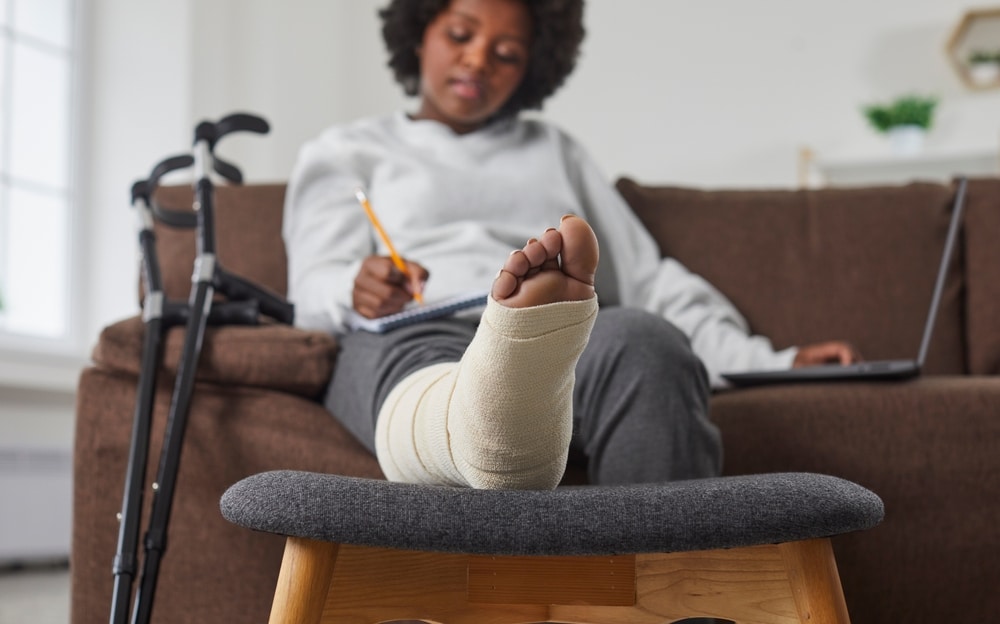Filing a personal injury claim can be daunting and confusing for someone unfamiliar with the process. You may have heard of people being awarded personal injury compensation after getting hurt in an accident, but what does that mean? Many types of compensation could help compensate for the pain and suffering caused by a severe accident, including from medical bills to emotional distress.
Whether your injuries have had a minor or significant impact on your life, understanding the ins and outs of personal injury law is essential in evaluating if filing a claim is right for you. If you need help understanding the process, the Maryland personal injury lawyers at Jezic & Moyse are ready to guide you. With our expertise, we can successfully get you the compensation you deserve.

What is Personal Injury?
Personal injury, one form of Tort Law, has existed for many years. It means any injury to one’s body or mind due to another person’s wrongful act or negligence. According to the law, the injured person may be entitled to receive monetary compensation from the person who committed the unlawful act, which may have resulted from intentional or negligent actions.
Personal injury damages are the amount you can receive for the harm done to you by the defendant once you win the case. But there’s no sure way of determining the damages you’ll receive since many factors go into play. The judge (or sometimes the jury) will base it on your situation’s facts or specific consequences.
The damages for personal injury can be awarded for medical expenses, wage loss, pain and suffering, emotional distress, etc. If you think your injuries resulted from someone else’s negligence or misconduct, you should contact a lawyer for legal advice.
The Different Types of Personal Injury Damages
The final element of negligence is damages. To recover, as the plaintiff, you must prove to the court of law that you suffered some harm, possibly due to personal injury or property damage.
In a personal injury case, you can collect three main types of personal injury damages: economic, noneconomic, and sometimes punitive damages.
- Economic damages: Under Maryland law, economic damages typically refer to the loss of earnings and medical expenses. But it also can include past and future medical costs, past and future loss of profits, and others.
- Noneconomic damages: This type of damage refers to pain, suffering, disfigurement, inconvenience, physical impairment, loss of consortium, or other nonpecuniary injuries. These “real-life” factors are often very important to an injured person but can be more difficult to estimate since it’s based on injuries not tied to a specific dollar amount.
- Punitive damages: In some cases, when the person at fault was proven to act with intent to injure someone, or with a malicious motive, the court may award punitive damages to punish the wrongdoer, and to deter others from similar bad acts. These are only available in some cases.
How to Claim Compensation for Personal Injury?
Personal injury cases are challenging for those who plan on representing themselves. Therefore, hiring an attorney to handle the matter is usually the best course of action. They have the sources and other tools to ensure that they retrieve all much-needed documents to support your case.
While many cases can be successfully resolved and valuable compensation provided to an injured person without the need for a court case, sometimes a lawsuit is required. Lawsuit filing can be complicated for a non-attorney. The process that usually starts lawsuits is the filing of an initial “Complaint” with the appropriate Maryland Court. It must have the facts of the case with the legal allegations of fault and liability. You must include specific references to case laws and statutes.
After that, the Complaint is served to the defendant. They only have specific days to respond to the Complaint, usually by filing what is known as the “Answer”. If it includes counter-claims against the plaintiff, they also have a specific number of days to respond.
In cases where the defendant fails to respond, the plaintiff may request a default judgment. In part, it’s when the judge hears the plaintiff’s case to determine if there’s enough proof to prove the defendant is liable for the damages.
It’s worth noting that you must file your claim on time, as Maryland has firm deadlines, including statutes of limitations. If you wait too long, you may be legally unable to recover any damages from the person responsible for your injury.

How is Personal Injury Compensation Calculated?
Personal injury is calculated in different ways, depending on the type of damage. Economic damages are relatively easier to calculate because it’s based on the financial losses incurred due to the injury. It includes medical expenses, loss of wages, and related costs associated with the injury.
For noneconomic damages, it’s more difficult since they are not easily quantifiable. But lawyers sometimes argue for the use of the Per Day Method
- The Per Day Method: The calculation takes a reasonable dollar amount and adds it to every day the victim takes to recover—for instance, $200 per day for 30 days. It can be difficult to determine a reasonable dollar amount, particularly if an injured person is not working with an experienced attorney.
It’s worth noting that the judge will instruct the jury on the law, and its application to each case, and each plaintiff’s claim for damages. But at the end of the day, it will still lie on the jury’s final decision. Consulting a lawyer experienced in personal injury cases is usually the best course of action.

Taking Legal Action with an Attorney’s Guidance for Personal Injury Cases
Legal action is sometimes the only way to recover from what you have lost, especially if the defendant refuses to pay any compensation. But this is a complicated process, and it’s usually best done with the help of an experienced lawyer.
Your attorney will be the one to explain all the legal rights that you have for these cases. Fortunately, Jezic & Moyse have years of combined experience in personal injury cases, with attorneys and staff who work only or primarily on personal injury cases. Book a consultation or contact us today, and we can work on your case immediately.

